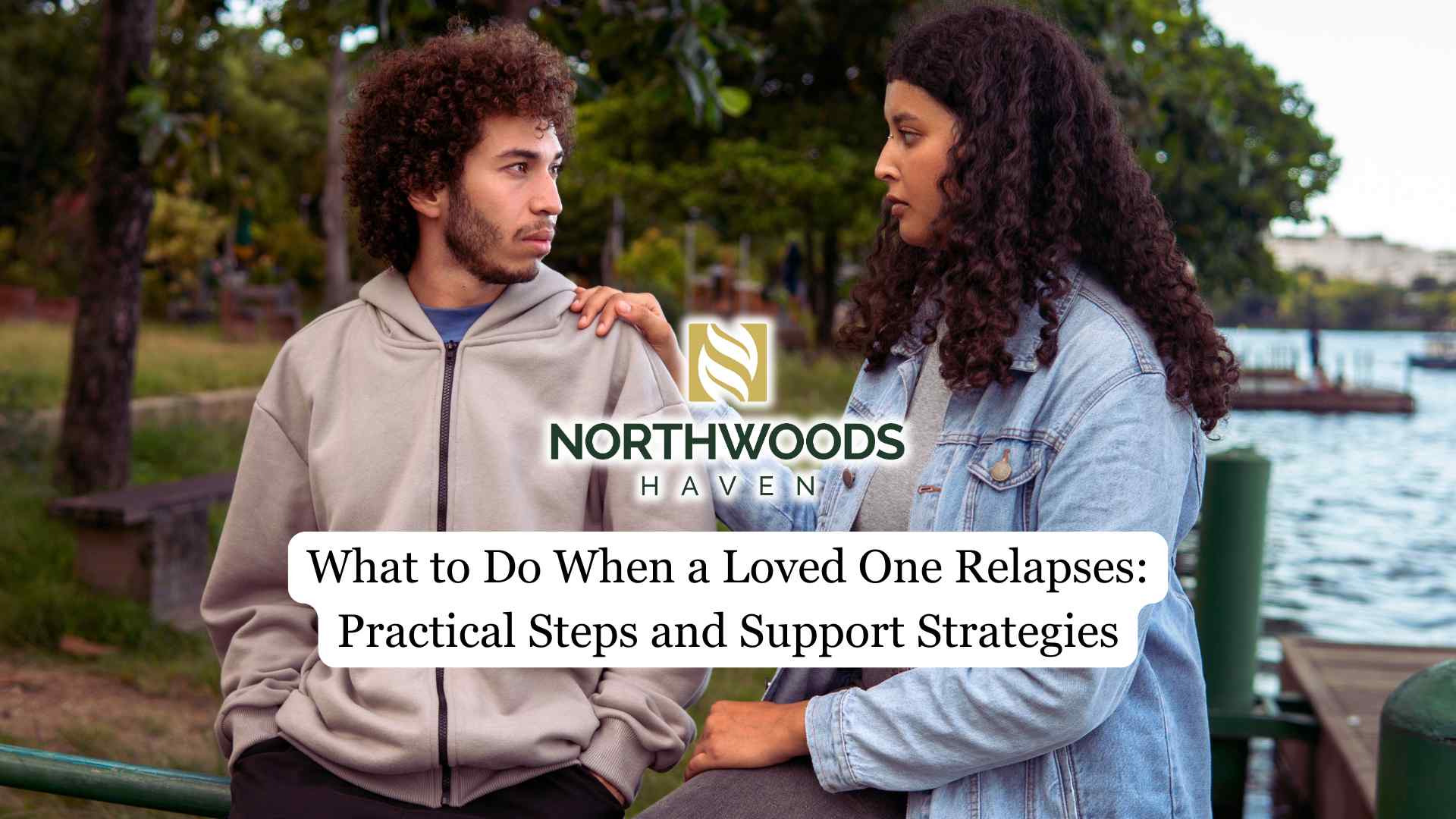When a loved one relapses, it can be deeply distressing. You’ll want to know what to do when a loved one relapses to support them effectively while managing your own emotions. Understanding that relapse is a common part of the recovery process can help you approach the situation with clarity and patience.
This article will guide you through recognizing warning signs, responding with compassion, setting healthy boundaries, and taking practical steps to support your loved one’s journey toward long-term sobriety.
Key Takeaways – Northwoods Haven Recovery, Minneapolis, Minnesota
- ✔ Relapse is a common part of the recovery process and should be viewed as a learning experience rather than a failure.
- ✔ Responding to a loved one’s relapse with compassion, empathy, and support is crucial for their addiction recovery; avoid blame and set healthy boundaries.
- ✔ Practical steps, such as encouraging professional help, identifying triggers, and revisiting the relapse prevention plan, can significantly aid in maintaining sobriety.
Need Addiction Help? Call Us Now.
Call NowUnderstanding Relapse in the Recovery Process

Relapse means a return to regular use of alcohol or drugs during recovery. While disheartening, alcohol relapse is a common part of the recovery process due to the chronic nature of substance use disorder. About half of individuals struggling with addiction experience relapse at some point in their recovery journey. Rather than viewing relapse as a failure, it should be seen as a learning experience, providing valuable insights into relapse prevention and long-term recovery.
Relapse occurs in stages, not just as a single mistake, and often signals a return to high-risk behaviors. Many individuals face a higher risk of relapse in their first year of addiction recovery due to environmental triggers. The brain’s reward system, altered by substance use, makes it harder to experience pleasure without drug use or alcohol abuse. Acknowledging that relapse is a common challenge helps in managing expectations and maintaining a positive recovery mindset.
Every day spent sober is a victory, and setbacks should not be seen as failures. Staying positive helps people recovering regain motivation after a relapse and reinforces the importance of relapse prevention strategies.
A relapse prevention plan provides opportunities for growth in the recovery process. Understanding the nature of relapse allows you to better support your loved one in maintaining long-term sobriety and avoiding triggers.
Responding with Compassion and Support
When a loved one experiences a relapse, it’s essential to approach them with kindness and offer support. Show empathy by trying to understand their struggles, recognizing that relapse is a common part of the recovery process. It’s important to be patient and provide encouragement while maintaining healthy boundaries. Offering emotional support without judgment can significantly enhance their chances of long-term addiction recovery.
Make it clear that you are ready to stand by them unconditionally throughout this challenging time. A strong support system is crucial in overcoming the difficulties of substance use disorder. Controlling emotional reactions and acknowledging that setbacks are a common part of the recovery journey can help you remain level-headed. Instead of reacting with frustration, choose compassion over aggression when offering direct assistance.
The subsequent sections will explore strategies to avoid blame, maintain healthy boundaries, and effectively communicate your feelings while supporting a loved one through relapse prevention.
Avoid Blame and Shame
Pointing fingers and shaming can intensify guilt feelings, pushing someone back toward their addiction. When disappointment is conveyed, it inflicts shame and guilt that can hinder the recovery process. Instead of asking why relapse occurs, which may provoke defensive reactions, choose compassion and avoid blame. Suggesting that their treatment programs might be ineffective can shake their confidence in the recovery journey and damage their belief in relapse prevention strategies.
It’s important to recognize substance use disorder as a medical condition, not a personal weakness or moral failure. Express your care, but make it clear that you won’t condone self-destructive behaviors linked to drug addiction. By addressing your own frustrations privately, you’ll be better positioned to offer support without judgment.
During difficult discussions, attentive listening and genuine empathy are essential. To provide proper emotional support, avoid assigning blame or dictating solutions. Instead, focus on being present and reinforcing their support system with understanding and patience.
Express Your Feelings Appropriately
Expressing feelings properly is vital in providing emotional support that does not create feelings of guilt. Strong relationships are crucial in the recovery process, as they help reduce the risk of relapse and prevent individuals from falling back into old habits.
Before offering advice, ask how you can offer support. This practice fosters mutual respect and understanding, both essential for maintaining a positive support system.
During your recovery journey, it’s important to set healthy boundaries while clearly communicating your own needs. Feeling angry or frustrated is completely natural, but managing these emotions constructively is key.
To maintain a supportive and encouraging connection—critical for addiction recovery—it is necessary to express emotions in a way that does not create shame or guilt for your loved one.
Practical Steps to Support Your Loved One

Taking practical steps to support your loved one can provide stability when they face difficult challenges. Help them explore treatment programs or accompany them to self-help meetings. Your proactive approach and encouraging attitude can strengthen their support system and reinforce their commitment to long-term sobriety.
Avoid enabling behaviors or attempting to control their decisions. Instead, focus on actively listening, offering emotional support, and encouraging them to seek professional help. Work alongside them to identify and avoid triggers, which can significantly impact their ability to stay sober. These actions are critical in fostering resilience and helping them navigate the obstacles of addiction recovery.
Listen Actively and Offer Emotional Support
Providing a non-judgmental ear is a powerful way to offer support to your loved one in their addiction recovery. Actively listening as they share their progress can strengthen their confidence and reinforce their commitment to staying sober.
Creating a safe environment where they feel comfortable expressing their emotions is essential for long-term sobriety. Simple gestures—such as giving them a hug, preparing a meal, or taking a walk together—can provide much-needed emotional support during their recovery journey.
When supporting someone who has encountered a setback in their recovery process, maintain a positive attitude and demonstrate unwavering encouragement. Pay attention to not just your words but also your body language and facial expressions to convey understanding and care.
Your presence and effort to create a nurturing atmosphere can be instrumental in helping them feel seen, valued, and less alone in their substance use recovery.
Encourage Professional Help and Addiction Treatment Programs
Encouraging a loved one to seek professional help is crucial in their journey toward addiction recovery. Connecting with a provider specializing in substance abuse treatment can help them address their struggles effectively.
A lapse in sobriety might prompt someone who hasn’t previously engaged in treatment programs to seek assistance from an addiction treatment program for the first time. A strong support system can significantly reduce the risk of future relapses and improve their chances of sustained healing.
Numerous confidential webchat platforms provide free assistance for individuals struggling with drug addiction and alcohol abuse. Various treatment programs, including medication-assisted treatment, intensive outpatient treatment, and Alcoholics Anonymous, equip individuals with the necessary tools to manage withdrawal symptoms and maintain long-term sobriety. Motivate your loved one to explore these options and reassure them that seeking professional help is a courageous step toward healing.
Help Identify and Avoid Triggers
Certain factors can provoke a relapse, such as:
- ✔ Experiencing stress – Increased pressure can lead to relapse.
- ✔ Feeling sad – Emotional lows may trigger substance cravings.
- ✔ Encountering loneliness – Isolation can weaken recovery motivation.
- ✔ Being angry – Uncontrolled emotions may fuel old habits.
- ✔ Dealing with boredom – Idle time increases risk of relapse.
Need Addiction Help? Call Us Now.
Call NowTriggers are specific stimuli that bring back memories of substance use, including drinking alcohol and using drugs—both of which are linked to high-risk behaviors. Situations like being at bars, parties, or around certain individuals may increase the risk of falling back into destructive patterns. Recognizing these triggers is essential for maintaining stability and avoiding relapse.
Discussing the sequence of events that led to a relapse with your loved one can help identify specific warning signs. Support from others plays a critical role in preventing lapses by fostering an environment conducive to recovery.
Since triggers cannot always be avoided, developing coping strategies is crucial for managing them effectively. Lessons learned from past relapses can help individuals recognize their personal triggers and refine their relapse prevention plan to include stronger coping skills.
Setting Healthy Boundaries

Establishing healthy boundaries is crucial to distinguishing support from enabling. Setting these limits not only protects your well-being but also reinforces the autonomy of the person’s life as they navigate addiction recovery. By maintaining boundaries, you promote your own healing and prevent becoming an ever-present crutch for your loved one.
Preserving boundaries becomes particularly vital when trust has been damaged due to addiction relapse. It’s essential to communicate both love and support while refusing to facilitate self-destructive behaviors. Clearly define what is acceptable, reinforcing that while you encourage their recovery, the responsibility remains theirs.
Supporters should not carry the burden of another’s choices or emotions. Extra support from self-help meetings or professional counseling can be valuable for those struggling to uphold boundaries while maintaining relationships.
In the next sections, we will explore how healthy boundaries manifest and how to steer clear of behaviors that unintentionally enable substance use.
What Healthy Boundaries Look Like
Establishing non-negotiable limits—such as refusing to accept lies, verbal abuse, or the presence of alcohol and drugs in your home—is essential for maintaining healthy boundaries. Likewise, it’s important to avoid making excuses for a loved one’s substance use and to define clear limits on how much emotional support you can provide. A collaborative approach to building a recovery strategy fosters a sense of responsibility and commitment, increasing the likelihood of successful rehabilitation.
By setting clear boundaries, individuals create a safe environment that benefits both supporters and those striving for sobriety. Such measures help deter behaviors that might inadvertently enable substance use relapse during the recovery process. Encouraging participation in Smart Recovery or an outpatient program can reinforce accountability while ensuring continued progress in addiction recovery.
Avoid Enabling Behaviors
Behaviors such as aggression, hostility, and making choices on behalf of a loved one can interfere with their recovery process. To prevent enabling these behaviors, refrain from making excuses for their substance use. It is essential in the support system to allow individuals to experience the natural consequences of their actions rather than shielding them from responsibility.
During discussions about potential setbacks in addiction recovery, avoid taking control or making decisions for them, as this can weaken their independence and commitment to getting better. A positive step is to stop drinking or using drugs around them, reinforcing healthy boundaries and creating a supportive environment for sustained sobriety.
Self-Care for Family Members

Ensuring personal well-being is fundamental for family members who are supporting a loved one struggling with addiction recovery. The emotional and financial strains that families endure highlight the importance of self-care practices. Engaging in routines that promote wellness—such as getting enough sleep, seeking guidance from trusted sources like the National Institute on addiction, and participating in support groups—can help prevent exhaustion and maintain the ability to provide meaningful emotional support.
Setting clear personal boundaries is an essential aspect of self-care, allowing individuals to communicate their needs effectively while reinforcing their own well-being. Additionally, acknowledging personal growth and resilience can help a person feel confident in their ability to maintain healthy relationships. Understanding the best course of action for maintaining mental and emotional health ensures that family members remain strong supporters without neglecting their own needs.
Subsequent sections will explore how prioritizing mental health, engaging in support groups, and recognizing a person’s ability to make choices in their recovery journey can contribute to a more balanced and effective approach to addiction recovery.
Prioritize Your Mental Health
It’s essential for caregivers to prioritize their mental health, as supporting a loved one in addiction recovery can be emotionally draining. Recognizing the importance of self-care is key to maintaining resilience and ensuring you can provide extra support without becoming overwhelmed. Engaging in healthy boundaries, getting enough sleep, and seeking guidance from support groups can help caregivers manage stress effectively.
Maintaining personal well-being is not selfish—it is necessary for sustaining a strong support system. Incorporating self-care routines, such as regular physical activity and professional help when needed, enhances both emotional and mental stability. Understanding the best course of action to protect one’s own mental well-being ensures that caregivers can continue offering meaningful support without neglecting their own health.
Seek Support Groups for Yourself
Participating in support groups like Al-Anon offers family members a space to share experiences and find extra support from others facing similar challenges. These groups provide valuable insights into the recovery process, helping loved ones understand substance use disorder while reinforcing the importance of healthy boundaries. Engaging in support groups can also demonstrate an active role in a loved one’s relapse recovery, ensuring that family members maintain emotional balance while encouraging their loved one toward treatment programs that support their sobriety.
Although family members can have a positive impact on their loved one’s relapse recovery, it remains the individual’s responsibility to make decisions regarding their own behavior. Recognizing small victories throughout the recovery journey can strengthen motivation and reinforce a commitment to remain sober. Seeking self-care and participating in support systems can make it easier to provide meaningful support while also safeguarding personal well-being.
Need Addiction Help? Call Us Now.
Call NowRevisiting the Relapse Prevention Plan

It’s crucial to revisit and refine the relapse prevention plan following a loved one’s relapse, adjusting it to address specific challenges that contributed to the setback. Strengthening coping strategies and exploring treatment options can help individuals regain stability and confidence in their ability to maintain sobriety. Engaging in self-help meetings and structured support groups can further enhance accountability and provide a strong foundation for sustained progress.
Establishing clear boundaries is essential in rebuilding trust and fostering healthier relationships after a relapse occurs. By consistently evaluating and refining the relapse prevention plan, individuals can better manage future relapses while reinforcing their commitment to a healthier lifestyle.
The next steps will focus on collaborating to develop a revised plan, tracking progress effectively, and celebrating personal milestones to maintain motivation and long-term success.
Collaborate on a Revised Plan
Discussing a relapse openly can strengthen understanding and help create an effective approach to moving forward. Recognizing and addressing warning signs early allows individuals to make adjustments before setbacks occur. A personalized plan should include strategies tailored to specific challenges and triggers.
To improve outcomes, it’s essential to clearly define steps to take when relapse occurs and ensure those offering support are aligned with recovery goals. By refining strategies and utilizing available resources, individuals can reinforce their commitment to making healthier choices. Support groups and professional guidance can provide valuable insights into refining these approaches, helping maintain progress over time.
Monitor Progress and Celebrate Milestones
Tracking progress and recognizing achievements can be crucial in preventing an alcohol relapse or addiction relapse. Celebrating small victories along the way reinforces motivation and helps solidify lasting behavioral changes. Keeping a record of warning signs and evaluating coping strategies makes it easier to adjust an individual’s recovery plan when necessary.
By routinely reviewing milestones, individuals can identify which strategies are working and which need improvement. Consistent monitoring also helps minimize the risk of future relapses by reinforcing positive habits. Acknowledging achievements, no matter how small, fosters confidence and encourages long-term success in the journey toward sustained sobriety.
Resources and Professional Help Options with Northwoods Haven Recovery
Explore our specialized treatment programs and therapy options designed to support long-term recovery:
- ✔ Intensive Outpatient Program (IOP) – Structured support while maintaining daily responsibilities.
- ✔ Outpatient Treatment Program – Flexible care for ongoing recovery needs.
- ✔ Relapse Prevention Therapy – Strategies to maintain long-term sobriety.
- ✔ Alcohol Addiction Treatment – Comprehensive care for overcoming alcohol dependence.
- ✔ Cocaine Addiction Treatment – Personalized therapy for cocaine recovery.
- ✔ Heroin Addiction Treatment – Specialized treatment for heroin dependency.
Need Addiction Help? Call Us Now.
Call NowFinding the Right Treatment Program
Many substance abuse treatment programs emphasize the importance of developing a relapse prevention strategy, ensuring individuals receive comprehensive support tailored to their needs. For example, medication-assisted treatments such as Brixadi® and Sublocade® have proven effective in helping those struggling with opioid addiction manage withdrawal symptoms and reduce cravings.
A person seeking recovery may have different requirements based on their history with alcohol addiction or drug dependency. Choosing an addiction treatment program that offers individualized plans can be crucial in addressing the unique challenges of each individual. Those who have experienced an alcohol relapse might benefit from specialized interventions designed to support long-term sobriety.
Working with a healthcare provider can significantly improve the chances of lasting recovery. The right treatment program not only provides medical support but also addresses behavioral and emotional factors related to using drugs and alcohol. Selecting an appropriate approach can help individuals feel empowered in their recovery journey while ensuring they receive the best possible care.
Utilizing Support Systems
Building a strong support system is essential for maintaining sobriety and reducing the likelihood of a drug or alcohol relapse. When a person is struggling with addiction, having a reliable network of friends, family, and peers can provide emotional stability and guidance. Many individuals facing mental health conditions alongside addiction find that engaging with a supportive community significantly enhances their recovery experience.
For example, groups like Al-Anon offer a space where individuals can share experiences, learn coping strategies, and find reassurance in knowing they are not alone. Being part of such groups helps people feel more connected, minimizing the isolation that often accompanies addiction.
Additionally, structured support can reinforce positive behavior changes. Whether someone is working through challenges related to using drugs, battling alcohol dependence, or recovering from drug addiction, support groups and professional guidance provide invaluable tools for long-term sobriety. By taking advantage of these resources, individuals can strengthen their recovery foundation and gain confidence in their ability to maintain a healthier lifestyle.
Summary of Helping A Family Member Who Has Relapsed
Supporting a loved one through a relapse can be challenging, but it’s important to remember that relapse is a common part of the recovery process. By responding with compassion and support, setting healthy boundaries, and taking practical steps, you can make a significant difference in your loved one’s recovery journey.
Take care of your own mental health and seek support for yourself to ensure you can provide the best support possible. Revisiting the relapse prevention plan and utilizing available resources and professional help options can help maintain long-term sobriety and prevent future relapses. Together, you can navigate this challenging time with strength and compassion.
Frequently Asked Questions
What is a relapse in the context of addiction recovery?
A relapse in addiction recovery is a setback where an individual resumes the use of drugs or alcohol after a period of abstinence. Recognizing this can help in taking necessary steps to regain control and continue the recovery journey.
How can I support a loved one who has relapsed?
To effectively support a loved one who has relapsed, respond with compassion and avoid blame, while encouraging them to seek professional help. Your understanding and emotional support can make a significant difference in their recovery journey.
What are some practical steps to help my loved one avoid relapse?
In order to prevent your loved one from experiencing a relapse, it’s important to offer attentive listening and emotional backing. Aid them in pinpointing the specific triggers that might impede their progress and urge them to engage with treatment programs focused on addiction. Adopting this multifaceted strategy can immensely strengthen their path towards recovery.
Why is setting healthy boundaries important in supporting someone with addiction?
Establishing healthy boundaries is essential because it helps differentiate supportive actions from those that enable, thus safeguarding both your well-being and the person who is in recovery, while also maintaining emotional security. Creating this equilibrium enhances the efficacy of the support system.
How can I take care of my own mental health while supporting a loved one in recovery?
To effectively support a loved one in recovery while caring for your own mental health, prioritize self-care, engage in support groups, and maintain healthy boundaries to prevent burnout. This approach ensures you can be a strong support while safeguarding your well-being.

Chris Henning combines addiction counseling expertise with a deeply personal approach to treatment. His specialized knowledge of opioid and stimulant disorders, coupled with cultural sensitivity, helps create meaningful connections in the recovery process.



